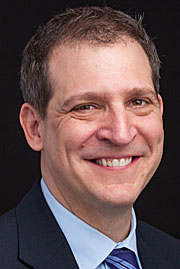David Gerard, associate professor of economics at Lawrence University, discusses the considerable consensus about climate policy that economists have reached in the college’s annual Honors Convocation.

Gerard presents “Is it Warm in Here? The Intractable Challenges of Climate Change” Thursday, May 14 at 11:10 a.m in the Lawrence Memorial Chapel in the 2014-15 convocation series finale. The event is free and open to the public. It also will be live streamed.
Following the address, Gerard also will conduct a question-and-answer session from 1-2 p.m. in the Warch Campus Center cinema.
The Honors Convocation publicly recognizes students and faculty recipients of awards and prizes for excellence in the arts, humanities, sciences, social sciences, languages and music as well as demonstrated excellence in athletics and service to others.
Gerard was chosen as speaker as the recipient of Lawrence’s annual Faculty Convocation Award, which honors a faculty member for distinguished professional work. He is the sixth faculty member so honored.
A specialist in risk analysis, Gerard will outline projected impacts of fossil fuel emissions on global temperatures and discuss the economic and political challenges associated with mitigating carbon emissions, drawing upon his research in electricity generation costs and “clean coal” technologies.
His research focuses on rules and regulations that govern everything from health and safety to the environment, including remediation of hazardous waste sites, automobile fuel economy and emissions and the effect of changing from standard time to daylight savings time on traffic fatalities.
He shared his expertise with the Senate subcommittee on Environment and Public Works on Clean Water Act reform in 2000 and spent two years as a member of a special National Academy of Sciences panel investigating the safety challenges of advanced automotive electronics, sparked by the rash of unexplained accelerator accidents in Toyota vehicles.
Gerard was instrumental in the development of two interactive websites that allow users to explore various dimensions of mortality risks. TrafficSTATS allows users to explore traffic risks for various vehicle types and demographic characteristics while Death Risk Rankings enables users to compare the probability of dying by various causes in the United States and the European Union.
Prior to joining the Lawrence faculty in 2009, Gerard spent eight years at Carnegie Mellon University as the executive director of the Center for the Study and Improvement of Regulation in the department of Engineering and Public Policy.
Gerard earned a bachelor’s degree in American studies and economics from Grinnell College and earned a Ph.D. in economics from the University of Illinois.
About Lawrence University
Founded in 1847, Lawrence University uniquely integrates a college of liberal arts and sciences with a nationally recognized conservatory of music, both devoted exclusively to undergraduate education. It was selected for inclusion in the Fiske Guide to Colleges 2015 and the book “Colleges That Change Lives: 40 Schools That Will Change the Way You Think About College.” Engaged learning, the development of multiple interests and community outreach are central to the Lawrence experience. Lawrence draws its 1,500 students from nearly every state and more than 50 countries.